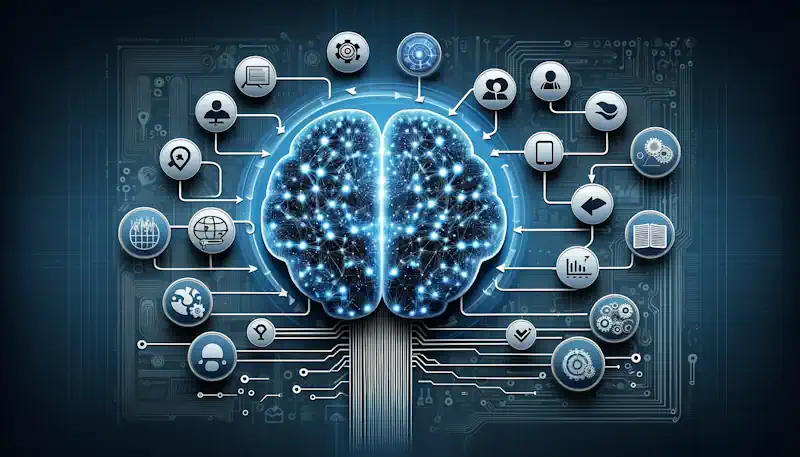Have you ever wondered how companies seem to know exactly what you’re interested in and show you ads that are spot-on? Well, the secret lies in something called algorithmic marketing!

Algorithmic marketing is all about using data and technology to create marketing campaigns that are tailored to your unique preferences. It’s a game-changer that allows companies to be more precise, efficient, and effective in reaching out to their customers.
Algorithmic marketing leverages complex algorithms and data-driven strategies to automate and enhance marketing efforts. This method involves using advanced technologies such as machine learning (ML) and artificial intelligence (AI) to process large volumes of data, identify patterns, and make informed marketing decisions. The goal is to optimize marketing activities, improve targeting, and increase return on investment (ROI) through precision and personalization.
Importance in Digital Marketing
In the digital age, where vast amounts of data are generated every second, traditional marketing methods fall short in handling and analyzing such volumes effectively. Algorithmic marketing addresses this gap by using algorithms that can process and analyze big data in real time. This leads to more accurate predictions and more effective marketing strategies. Key benefits include enhanced targeting, personalized customer experiences, improved efficiency, and adaptability to market changes.
Key Concepts and Principles
- Data-Driven Decision Making: Central to algorithmic marketing is the reliance on data to guide decisions. By analyzing customer behavior, preferences, and trends, marketers can tailor their strategies to meet specific needs and optimize outcomes.
- Machine Learning and Artificial Intelligence: These technologies enable the development of models that can predict customer behavior, segment audiences, and automate decision-making processes. AI and ML are crucial for handling complex tasks that require processing large datasets and making real-time adjustments.
- Predictive Analytics: This involves using historical data to predict future outcomes. In marketing, predictive analytics can forecast customer trends, potential sales, and the success of marketing campaigns, allowing for proactive strategy adjustments.
Historical Development
Algorithmic marketing has evolved significantly over the past decades. Early marketing efforts were manual and relied heavily on intuition and basic statistical analysis. With the advent of digital technologies and the internet, the volume of data available to marketers increased exponentially. This shift necessitated more sophisticated tools and techniques, leading to the integration of algorithms in marketing strategies.
Key milestones include the development of early predictive models in the 1990s, the rise of AI and ML in the 2000s, and the recent advancements in real-time data processing and automation. Each of these advancements has contributed to the current landscape where algorithmic marketing is a critical component of digital marketing strategies.
Core Components
- Data Collection and Processing: Gathering data from various sources (e.g., social media, website analytics, CRM systems) and processing it to be used by algorithms.
- Algorithm Training and Optimization: Using ML techniques to train algorithms on historical data, optimizing them to improve accuracy and effectiveness.
- Implementation in Marketing Strategies: Applying algorithms to automate tasks such as ad targeting, content recommendations, and customer segmentation.

Benefits of Algorithmic Marketing
- Enhanced Targeting and Personalization: Algorithms can analyze customer data to deliver highly personalized content and offers, improving engagement and conversion rates.
- Improved Efficiency and ROI: Automation reduces the time and effort required for marketing tasks, leading to cost savings and higher ROI.
- Real-Time Data Analysis and Adaptability: Algorithms can process data in real time, allowing marketers to quickly adapt to changing market conditions and customer behaviors.
Types of Marketing Algorithms
- Recommendation Algorithms: Suggest products or content to users based on their past behavior and preferences.
- Predictive Modeling: Forecasts future customer actions and trends using historical data.
- Natural Language Processing (NLP): Analyzes and understands human language to improve customer interactions and content relevance.
Case Studies and Examples
Several companies have successfully implemented algorithmic marketing strategies:
- Amazon: Uses recommendation algorithms to suggest products to customers based on their browsing and purchase history, significantly boosting sales.
- Netflix: Employs predictive modeling and NLP to recommend movies and shows, enhancing user satisfaction and retention.
- Spotify: Utilizes algorithms to create personalized playlists and music recommendations, increasing user engagement and loyalty.
Algorithmic marketing represents a significant advancement in the way businesses approach marketing. By leveraging data and advanced technologies, companies can achieve greater precision, efficiency, and effectiveness in their marketing efforts.

